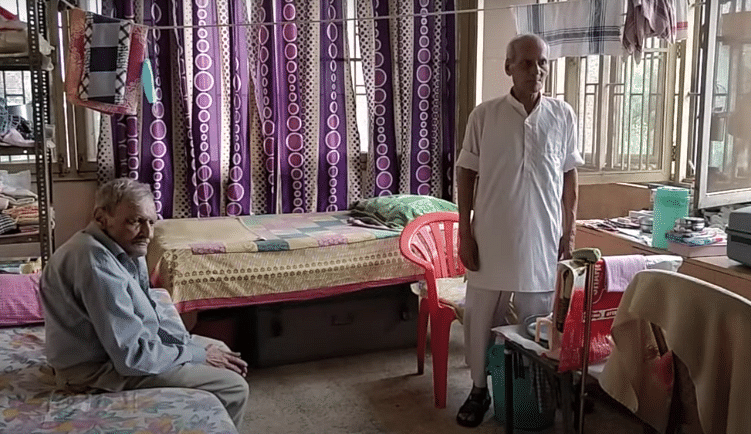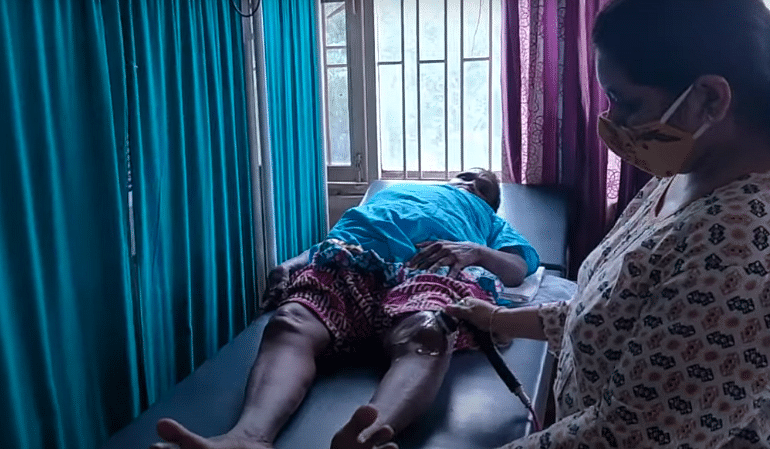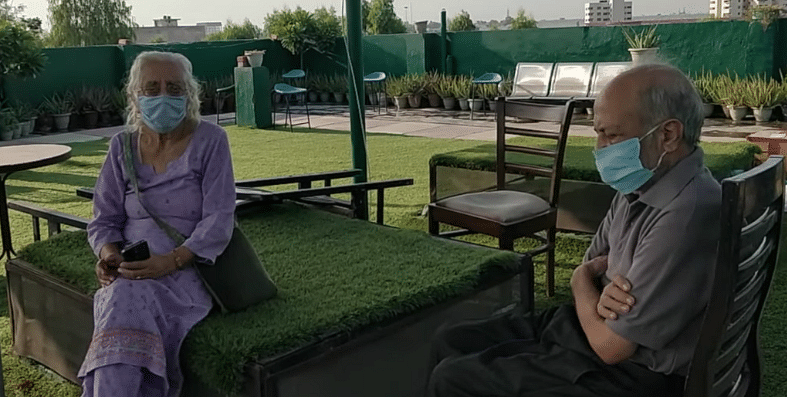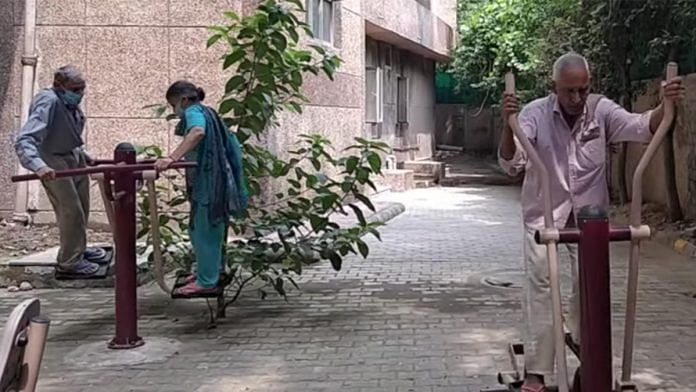New Delhi: In a government-run old age home in West Delhi’s Bindapur area, an 80-year-old woman with a slight hunch, yells for her son while walking with her helper. After being abandoned by her family at a railway station three years ago, this is a regular occurrence.
This facility is home to several such abandoned and destitute senior citizens. It houses over 60 people, 12 men and 48 women, between the ages of 60 and 80 even though it has a capacity of only 50.
“Since we are free of cost and government-run, we cannot refuse anybody and therefore are exceeding our capacity”, Saroj Rawat, the Delhi government district social welfare officer, told ThePrint.
And these cramped circumstances have proven to be especially risky during the coronavirus pandemic.
The elderly population is particularly susceptible to contracting a severe form of Covid-19 because most of them suffer from comorbidities — underlying conditions — like diabetes and lung diseases.
In early August, the government had revealed that 50 per cent of the total Covid deaths (42,518) at the time occurred in the age group of 60 years and above. India has recorded over 80,000 deaths until now.
Research indicates that comorbidities combined with an ageing immune system make Covid patients above the age of 80, 100 times more likely to die of the virus than those who are under 40.
Furthermore, the elderly who are not vaccinated against the flu or pneumonia and resided in old age homes, were at high-risk of developing severe Covid infection.

Also read: High Covid fatality in states linked to elderly population, peak a month away — SBI report
Counselling sessions, regular sanitisation of building
In a bid to ensure the protection of this high-risk group, old age homes in Delhi have taken several steps to avoid the spread of the infection.
Senior citizens comprise 10 per cent of Delhi’s population of up to 1.86 crore people.
At present, there are three government-run old age homes in Delhi (in Lampur, Bindapur and a new one in Wazirpur) and approximately 40 private-run facilities, according to Delhi government records.
The Bindapur old age home, near Dwarka, has been functioning since 2011, and amid its 60 occupants, at least 17 suffer from diseases like dementia and Alzheimer’s.
Therefore, the lockdown has not been easy for Rawat and her staff of about 14 caregivers, physiotherapists, cleaners and doctors.
To ensure utmost safety there was a highly selective vendor-picking process for food, bi-weekly sanitisation of the building, no outside food was allowed and the residents were not allowed to leave their rooms at the height of the lockdown.

On 4 August, the Supreme Court had also asked central government to ensure that all safety precautions were taken in such facilities and the caregivers were equipped with masks, PPE kits and sanitisers.
However, in this facility, the caregivers are yet to be provided with any PPE kits.
Rawat explained that due to the remoteness of the place it was also difficult to ensure mobility of the staff and, therefore, during the lockdown the facility was functioning with a skeletal staff. Last week, everyone in the home (both patients and caregivers) were tested for the first time and all tested negative.
She also spoke about how several elderly patients had developed mental health and anxiety-related problems due to the pandemic, which is why the home had started conducting regular mental health camps and counselling sessions.
The old age home has now gradually allowed the patients to resume recreational activities such as exercising in the outside gym, watching movies, art sessions etc.
Dr Rashmi Singh, director of the Department of Social Welfare in the Delhi government, said that she hoped for greater synergy between citizens and the government in filling the gaps in the care extended to the elderly in such facilities.
“I hope we get more caregivers on a volunteer basis as we also have our limitations. I would like to encourage people to come forward and help. It would benefit the elderly people as well,” said Singh.
Also read: Why India needs to be a model to the world on Covid vaccine delivery
Confined to rooms, no visitors allowed
Privately-run elderly homes are also in a similar situation.
‘Silver Linings Old Age Home’ in Dwarka, recently, had a scare when two of its staff members tested positive for Covid-19.
“They were immediately tested and isolated from the rest of the caregivers and patients,” said Dr Sanjay Kumar Jain, the facility in charge.
A week ago, three more staffers and one patient were tested after they complained of a few symptoms. “Thankfully, they all tested negative”, said Jain. “Even if there is a single complaint of any symptom we are getting people tested because if it spreads here then it will be very dangerous.”
There are 40 people residing in the three-storey facility but 10 of them were sent back to their homes because they were not following the rules or listening to the caregivers.
Of the total residents, 20 per cent suffer from Alzheimer’s and dementia.
The facility charges anywhere between Rs 9,000 to Rs 90,000 per month for rooms that range from a shared dormitory to a private deluxe air-conditioned room.
To ensure that no one is at risk of the disease, the facility has mandatorily made the entire staff stay within the premises.
P.R. Chaddha, a 75-year-old resident, recently moved into the facility in April after his wife passed away.
According to Chaddha, the pandemic had taken a severe mental toll on him, so much so that he was not able to carry out daily functions and was taking psychiatric treatment regarding the same.
Another resident, 78-year-old Mohini Bhutani explained that for the longest time she was restricted to her room and it was only now that she could come up to the terrace and sit outside.
“It was nice to see the sun after so long”, said Bhutani. “I want to go out but also understand why I cannot.”
Jain said, “Till the vaccine comes, we will not allow anyone to go outside.”

Similarly, at the Second Innings Old Age Home in Vasant Kunj, most of the caregivers have been made to stay in the facility and are not allowed to go out.
“This is the most vulnerable population, if anything happens it will be very difficult to deal with,” said Harsh Kumar, the manager of the facility.
The old age home has recently started visits from families, however, family members are not allowed physical contact and need to maintain a distance of six feet. Before this, all family visits were taking place virtually either through Google Meets or Zoom.
To ensure that nobody panics or gets anxious due to the news regarding Covid-19, the facility also started Covid counselling sessions to allay fears.
However, the pandemic has also come at a cost. The Second Innings Old Age Home doesn’t have a fixed amount for payment and due to the pandemic 10 members (out of 20) have been unable to pay any fees, which is causing a lot of financial strain.
“I can’t ask the family to pay when they cannot as I understand how jobs were hit due to the pandemic. And I cannot kick them out of the home. Therefore I am trying to find a way to manage,” Kumar told ThePrint.
Also read: Modi govt admits Covid reinfections are happening, but says infection mild both times



